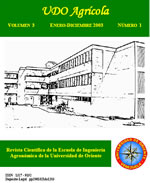
|
Revista Científica UDO Agrícola
Universidad de Oriente Press
ISSN: 1317-9152
Vol. 12, No. 2, 2012, pp. 407-417
|
 Bioline Code: cg12046
Bioline Code: cg12046
Full paper language: English
Document type: Research Article
Document available free of charge
|
|
|
Revista Científica UDO Agrícola, Vol. 12, No. 2, 2012, pp. 407-417
| es |
Valorización del conocimiento local y ancestral mediante la percepción del clima en comunidades agrícolas indígenas del sur de Anzoátegui
Olivares, Barlin; Sindoni Vielma, María; Valderrama, Jamilet & C. Aray, Juan
Resumen
Las comunidades agrícolas han sido seriamente afectadas por la variabilidad del clima, en este sentido, muchas de ellas han
desarrollado ciertas habilidades para observar y explicar adecuadamente las dinámicas astronómicas, rituales y otras
manifestaciones de la fauna y la flora. De esta manera se planteo como objetivo reconocer la autonomía cultural de la
comunidad indígena Kariña, al sur del estado Anzoátegui, en el contexto climatológico, a través de la valoración de la
diversidad del conocimiento ancestral para determinar los efectos y adaptaciones asociados a los recursos naturales. Se
enmarca en el enfoque de investigación participativa mediante la técnica dialogo de saberes, involucrando 49 participantes
de tres generaciones: ancianos, adultos y jóvenes. Se utilizo el análisis por componentes principales (ACP) para la
interpretación de los datos. Mediante el ACP se seleccionaron los primeros cinco componentes que explicaban el 72.0% de
la variación total. Un primer componente asociado a las variables: Localidad y Sexo aportaron el 23.0% de la varianza total.
Se identificó a: El congorocho, pájaro Tijereta, Chicharra, El Bachaco, El Relampago y fase lunar como bioindicadores
climáticos y manifestaciones astronómicas en actividad agrícola. Todos estos fueron mayormente utilizados por las adultos
mayores de la cultura Kariña que representan el 10.0% de los participantes. Los resultados permitieron recrear, reconstruir y
revalorizar los saberes locales en las prácticas cotidianas en el pronóstico del clima para el uso y manejo de sus cultivos.
Este análisis permitió generar herramientas para una educación rural con mayor pertinencia social y cultural para las nuevas
generaciones.
Palabras-clave
Variabilidad climática, conocimiento ancestral, adaptaciones climáticas, diagnóstico participativo, bioindicadores climáticos.
|
| |
| en |
Valorization of local knowledge and ancestral by the perception of climate in indigenous farming communities of southern Anzoátegui
Olivares, Barlin; Sindoni Vielma, María; Valderrama, Jamilet & C. Aray, Juan
Abstract
Farming communities have been seriously affected by climate variability, in this sense, many of them have
developed certain skills to properly observe and explain astronomical dynamics, rituals and other forms of fauna and flora.
The objective of this study was recognize the cultural autonomy of the indigenous community Kariña, south of the state of
Anzoategui, in the context of climate, through the assessment of the diversity of ancestral knowledge to determine the
effects and adjustments related to natural resources. The participatory research approach through technical dialogue of
knowledge, involving 49 participants from three generations: the elderly, adult and youth was considered. The principal
component analysis (PCA) for data interpretation was used. Through the PCA were selected the top five components that
explained 72.0% of the total variation. A first component associated with the variables: Location and Sex accounted
for 23.0% of the total variance. Were identified: El congorocho, pájaro Tijereta, Chicharra, El Bachaco, El Relampago and
moon phase as bioindicators astronomical climatic and farming demonstrations. These were mostly used by adults
over Kariña culture representing 10.0% of the participants. The results allowed us to recreate, rebuild and add value to local
knowledge in everyday practices in the weather forecast for the use and management of their crops. This analysis allowed
the generation of tools for rural education with greater social and cultural relevance for new generations.
Keywords
Climate variability, ancestral knowledge, climatic adaptations, participatory assessment, climate bioindicators.
|
| |
© Copyright 2012 - REVISTA CIENTÍFICA UDO AGRÍCOLA
Alternative site location: http://www.udoagricola.orgfree.com
|
|
